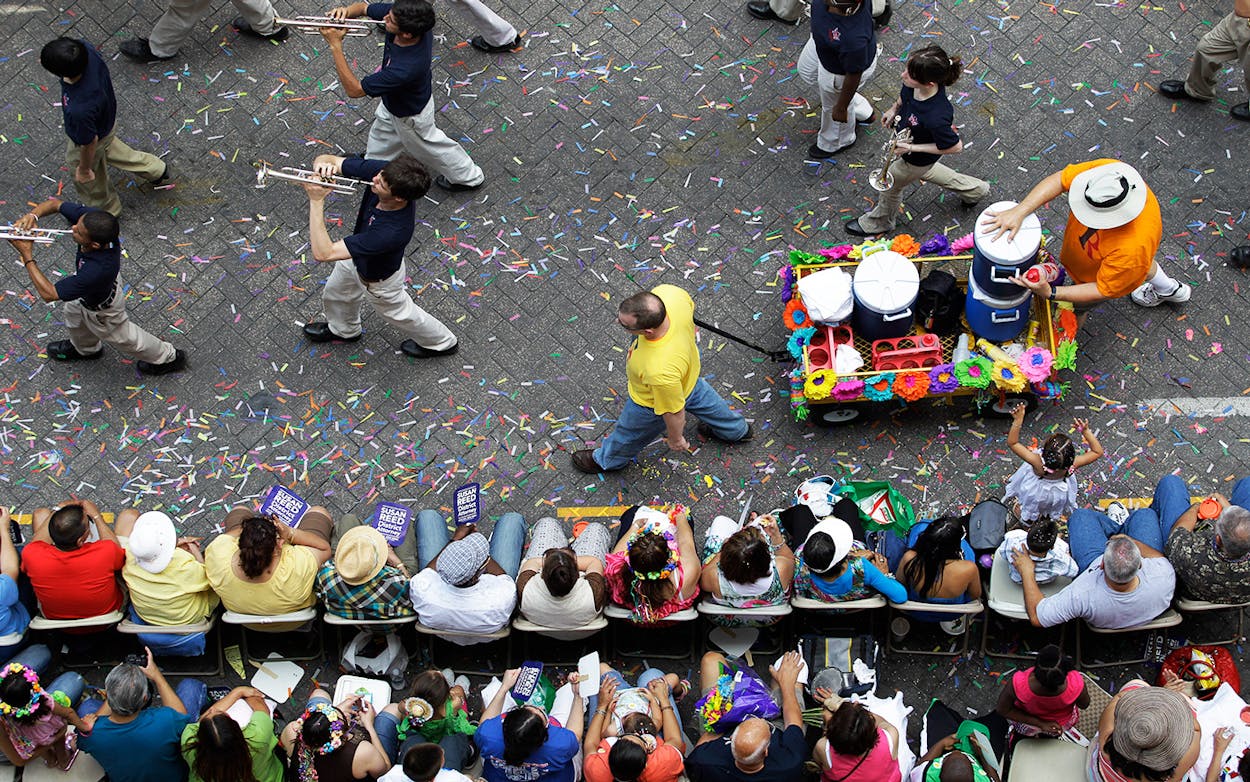For the first time in 75 years, Fiesta—San Antonio’s annual ten-day cultural festival that brings together more than one hundred organizations and nearly 3.5 million people to celebrate the city’s history with food, music, and parades—will not take place in April. As of this morning, the city’s annual “party with a purpose” is rescheduled for November.
In light of the city’s first travel-related COVID-19 case late last night, Mayor Ron Nirenberg extended a seven-day public health emergency for San Antonio, a measure that also prohibits large gatherings of five hundred people or more. The emergency effectively canceled events in the immediate future, including the Tejano Music Awards Fan Fair, scheduled for this weekend, and the St. Patrick’s Day Festival and Parade, but originally left Fiesta’s future in April uncertain.
With two other massive Texas events—Austin’s South by Southwest Festival and the Houston Livestock Show and Rodeo—canceling in the past week, the city of San Antonio has faced mounting pressure to call off Fiesta. Some believed that the festival could avoid cancellation because of the largely local crowd that it draws: while nearly 75 percent of SXSW attendees are international, 75 percent of Fiesta’s attendees live in the San Antonio area, according to Amy Shaw, executive director of the Fiesta San Antonio Commission. But as awareness around the virus grows, and non-travel-related cases continue to crop up throughout Texas, local and state authorities alike have stressed caution to help slow community spread of the disease, and by urging people to practice social isolation as much as they can. As of Friday, the San Antonio Book Festival, originally scheduled for early April, has also been canceled.
At a press conference this afternoon, reporters raised concerns that holding the festival from November 5 through 15 would clash with other area events that take place in the fall, such as Wurstfest and Luminaria. “Is San Antonio a town that can’t have more than one party at the same time?” Nirenberg responded. “It’s hard to figure out where the Fiesta begins and ends because we’re in a constant state of community celebration, but what we’re saying is that we’re going to take the precautions necessary to take care of your health. The Fiesta will go on.”
Throughout its 129 years as a festival, Fiesta has gone on as planned every year—apart from 1918 during World War I, and in 1942-1944 during World War II. A 2017 study from UTSA Institute for Economic Development found that, in 2016, the festival contributed $340.1 million in total sales and supports nearly 3,500 full-time-equivalent jobs, which includes vendors, hotel staff, restaurant and other service industry positions. Shaw reassured people during a Friday press conference that “generally speaking,” tickets that have already been purchased would be honored in November—with the caveat that, with more than one hundred nonprofit organizations participating in the event, it was difficult to say what that might mean for everyone who was originally planning to attend next month.
The event also provides support to a number of local nonprofits and other organizations. The League of United Latin American Citizens, which began the city’s annual Rey Feo tradition in 1945, raises tens of thousands of dollars each year for scholarships that are primarily awarded to first-generation college students, for instance. A Night in Old San Antonio (NIOSA) also brings in roughly $1.5 million annually for the San Antonio Conservation Society. Prior to today’s announcement, NIOSA chairwoman Terry Schoenert told the San Antonio Express-News that a cancellation could mean staff cuts and eliminating grants.
One Fiesta staple that won’t be making the jump to November is the annual Oyster Bake, which has taken place over two days on the St. Mary’s University campus for more than a century, and draws in more than 60,000 attendees and helps fund the university alumni association’s student scholarships. “We’re actually going to cancel the 2020 Oyster Bake,” executive director Steve Rosenauer told Texas Monthly. “Being on the St. Mary’s campus, there are other things going on in the November time frame, and it’s very difficult to guarantee that our performers will be able to commit to a November date. It’s going to significantly impact the scholarships that we raise money for. But we’ll tighten our belts and see what we can do when we meet in the next few days.”
Dr. Anthony Fauci, the director of the National Institute of Allergy and Infectious Diseases, has estimated that a potential vaccine for COVID-19, the disease caused by the new coronavirus, is still a year to a year and a half away—so it’s still unclear whether postponing Fiesta until November will remain a viable option. Shaw said the Fiesta commission would continue to work closely with Metro Health, the city’s public health agency, to monitor the situation in the months leading up to the new dates.
Garrett Heath, founder of SA Flavor, a local retailer that makes Fiesta medals that are bought, collected, and traded at events throughout the city as part of the celebration, said he was optimistic about the festival’s postponement, though. (The medals that Heath makes raise money for local nonprofits and charities with each sale, too.) “Fiesta canceling wouldn’t have just been bad news for my business, but it would’ve been horrible for nonprofits,” Heath said. “These organizations raise money for low income kids, historic preservation, cultural groups. I’m thrilled that we’re postponing. We all want it in April, but with everything going on, I’m hopeful about a fall Fiesta.”
- More About:
- Business








